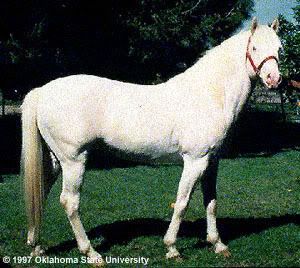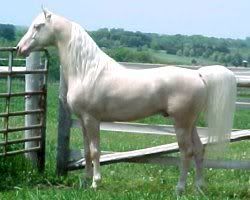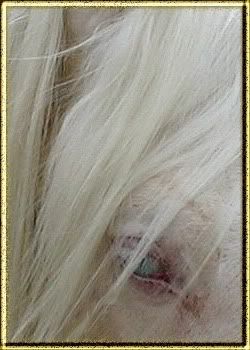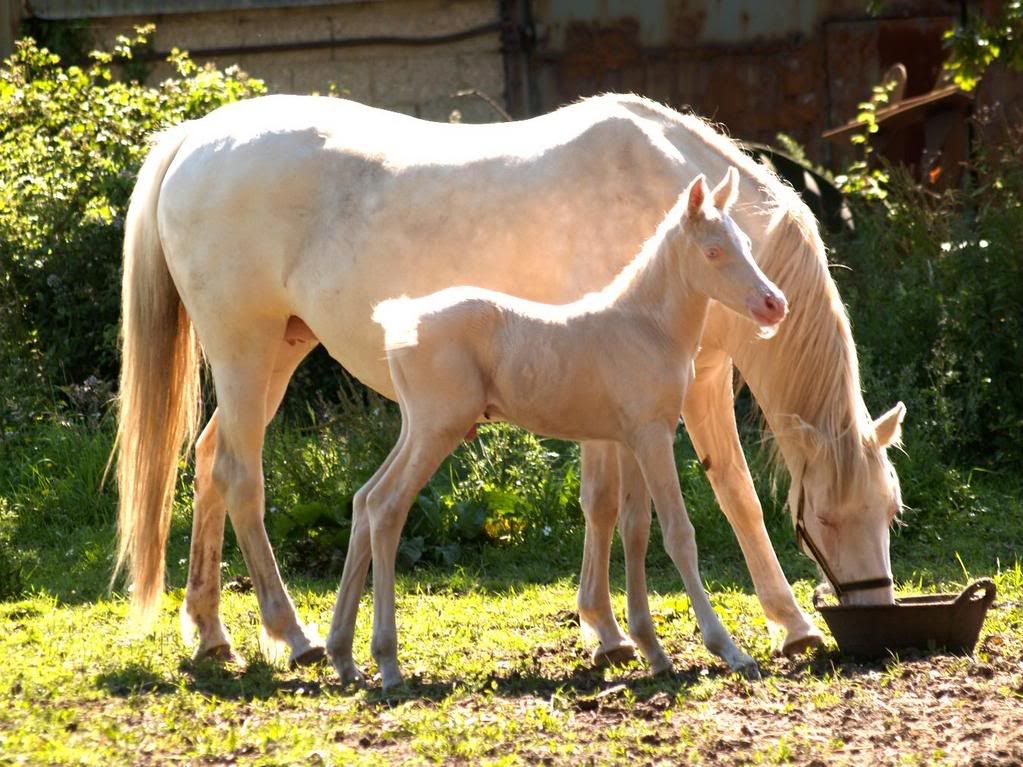| Author |
 Topic Topic  |
|
|
|
nicolanapper
Platinum Member
    
England
4247 Posts |
 Posted - 08 Jul 2007 : 2:55:30 PM Posted - 08 Jul 2007 : 2:55:30 PM




|
Please can someone explain to me what the difference is between a Cremello colour and Albino? and does crossing a Cremello with a chestnut result in a palamino?
Please forgive my ignorance!
Nicky
|
|
Report to moderator
|
|
|
Tahir
Platinum Member
    

United Kingdom
4572 Posts |
 Posted - 08 Jul 2007 : 3:11:22 PM Posted - 08 Jul 2007 : 3:11:22 PM




|
I certainly don't think you are "ignorant" Nicky, I say that if you don't ask you will never know!!!
I think (and please don't treat this as Gospel) that Cremello's have a colour gene (possibly chestnut or palomino), and Albino's are more of a freak of nature - as in they have no colour gene's, they are "pure" white and can be born from any colour of parents???. But they both have pink skin, so that makes me even more confused!!! I am sure someone on AL is much more knowledgeable than me, and I will be so interested to find out???
Also crossing a cremello with a chestnut will invariably result in a palomino, but I don't think this is guaranteed everytime. There must be a palomino breeder on AL that has the answer???
Carla, xx.
Carla, xx. |
Report to Moderator  |
|
|
Havenbeech
Silver Member
  

Wales
427 Posts |
 Posted - 08 Jul 2007 : 4:32:39 PM Posted - 08 Jul 2007 : 4:32:39 PM




|
Hi Nicola
To date, there has been no scientifically proven/reported incidence of albinism in horses.
Albinism in any breed is where the individual lacks all form of pigment, making the skin white(pink), and the eyes pink (from where the blood passes through the transparent tissues of the eye).
This is where the blue eyes of the cremello become the proof that the horse you see in front of you cannot be an albino.
The cremello has pigment, as do chestnuts/bays/blacks/palomino's etc.
The only place any of these colours will have pink skin is underneath white markings.
(Hence the myth that cremello's suffer badly in the sun is just that - A MYTH) Cremellos suffer no worse in the sun than any other colour as their skin IS pigmented. Probably where this myth originated is due to the difficulty in telling where, and to what extent white markings are on a cremello.
A wide blaze and pink muzzle will burn on a bay, but on a cremello where it is often difficult to tell where the markings lay (especially when they also carry the greying gene) it was put down to these perculiar looking animals having poor resistance to the suns rays.
Nowadays, with genetics fast advancing, we have a greater understanding of colour genetics and foibles.
With regards to colour production, i have long been saying that the cremello's are the hidden stars of the breeding barn, the "coloured boom" where people exhibit their stallions mares & offspring has taken over the country, yet the palomino breeders, many of which have cremellos tucked away in their stables producing fabulous palomino offspring rarely let them off the farm let alone in the showring!
Recently we have seen some of the larger studs importing double dilute warmblood/performance stallions to bring some extra colour to their breeding programme. I'm guessing this is only the start of the blue eyed boom!
It is true that cremello x chestnut results in palomino 100% of the time. To understand dilutes you first need to understand the base colours that represent them.
If you view "The cream gene" like you view the coloured gene in terms of homozygosity then it is very simple.
Creme is dominant, as is Tobiano so...
A palomino, buckskin or smokey black is a heterozygous cream. All progeny will have a 50/50 chance of inheriting this gene from them.
A cremello, perlino or grulla (sp!) is a homozygous cream. All progeny will inherit the creme gene from them 100% of the time.
Cremello X Chestnut = Palomino
Cremello X Bay = Buckskin
Cremello X Palomino = palomino/cremello
Cremello X Buckskin = buckskin/perlino
The above examples are a simplified version of what to expect from a colourXcolour mating.
To be more accurate about the outcome of your foal, you need to take into consideration the parents and grandparents colouring, this is because many colours can mask other colours, ie - a bay horse crossed with a cremello will produce a buckskin, unless the bay horse is also a carrier of chestnut which means it could then also have a palomino foal.
Chestnut is the most recessive colour in the equine world, which probably explains why there tend to be more palomino's about than buckskins as the recessive chestnut tends to crop up quite often.
Please dont think you're ignorant! Many people still believe that breeding for colour is a lottery, even when the facts are laid out before them! Armed with basic colour genetic knowledge, it is simple to pick and chose your breeding carefully enough to guarantee the colour of your foal,
and make those eleven months a littel shorter to wait!
Sorry for going off on one! LOL It just happens to be a subject that i am quite passionate about! Anything you want to know, please ask and i'll do my best to answer, i'm no expert - i've just busily stored away snippets of information over the last 5 years and gradually (TRUST ME) things begin to make sense!  |
www.havenbeech-stud.co.uk
Breeding Pinto & Dilute Part Bred Arabians & Welsh Ponies
 |
Report to Moderator  |
|
|
nicolanapper
Platinum Member
    
England
4247 Posts |
 Posted - 08 Jul 2007 : 4:54:33 PM Posted - 08 Jul 2007 : 4:54:33 PM




|
Wow, thank you very much for explaining that to me Carla and Jodi. In many ways colours and genetics is quite logical, and just seems complicated when facts and figures are stated.
Thank you once again.
Nicky |
Report to Moderator  |
|
|
Coloured_Arabs
Bronze Member
 
United Kingdom
154 Posts |
 Posted - 08 Jul 2007 : 6:12:34 PM Posted - 08 Jul 2007 : 6:12:34 PM




|
Yikes Jodi -Have you ever thought of writing a book!!   |
Report to Moderator  |
|
|
janine87
Bronze Member
 
England
221 Posts |
 Posted - 08 Jul 2007 : 6:34:25 PM Posted - 08 Jul 2007 : 6:34:25 PM




|
Hiya,
Yes your post was very interesting , i will save it for future referance! thanks x |
Report to Moderator  |
|
|
Havenbeech
Silver Member
  

Wales
427 Posts |
 Posted - 08 Jul 2007 : 8:25:44 PM Posted - 08 Jul 2007 : 8:25:44 PM




|
Sorry 
Like i said - i'm quite passionate about colour! LOL 
The basics are easy - what you have to allow for are the modifiers that can alter or disguise certain colours & shades, i'm still getting my head around that!
But still, facts are facts, and if you're desperate to know something your eyes and your pedigree cant see - you can always test - and its quite cheap too! 
|
www.havenbeech-stud.co.uk
Breeding Pinto & Dilute Part Bred Arabians & Welsh Ponies
 |
Report to Moderator  |
|
|
Sarahw
Gold Member
   

England
746 Posts |
 Posted - 08 Jul 2007 : 10:21:01 PM Posted - 08 Jul 2007 : 10:21:01 PM




|
| I dont think there is anything I can add to that - lol ! ! ! ! |
   |
Report to Moderator  |
|
|
Tahir
Platinum Member
    

United Kingdom
4572 Posts |
 Posted - 09 Jul 2007 : 09:17:12 AM Posted - 09 Jul 2007 : 09:17:12 AM




|
Beautifully explained Havenbeech, and thank you for sharing such interesting information and making it so easy to understand. Nicky, I have often wondered how Cremello's were made, so thank you for asking the question. My first pony was cremello, he was (apparently) Arab x Welsh. Everyone thought he was ugly but to me he was the most beautiful and talented pony in the world, he was also super intelligent and athletic, and I would have never swapped him for any of my friends "better looking" ponies.
Shame he was a gelding really, I could now be breeding beautiful palominos or buckskins!!!!
Carla, xx. |
Report to Moderator  |
|
|
Tahir
Platinum Member
    

United Kingdom
4572 Posts |
 Posted - 09 Jul 2007 : 09:27:22 AM Posted - 09 Jul 2007 : 09:27:22 AM




|
Thought you might like to see a pic of my first pony "Tetrie", this was taken about 1974 and we had just finished a sponsored ride (he was so versatile).

Carla, xx. |
Report to Moderator  |
|
|
nicolanapper
Platinum Member
    
England
4247 Posts |
 Posted - 09 Jul 2007 : 10:38:42 AM Posted - 09 Jul 2007 : 10:38:42 AM




|
Carla, what a lovely boy, I see it looks as if you were riding him in hackamore too, am I correct? I have very similar photographs of me taken in about the same year as your picture, on my New Forest pony, also wearing a hackamore! Obviously quite fashionable then!!
I do agree with you though, it is interesting to see Cremellos, how they cross, and why in days gone by they were kept hidden away.
One of my favourite colours is dun, probably because I used to ride an amazing boy of this colour every week in my riding school years, and he was one of those push button horses ( I used to pretend I was at Wembley or such like, just like all those famous showjumpers in the 1970's) . Oh to be young again!! . Oh to be young again!!
Nicky |
Report to Moderator  |
|
|
janine87
Bronze Member
 
England
221 Posts |
 Posted - 09 Jul 2007 : 10:45:35 AM Posted - 09 Jul 2007 : 10:45:35 AM




|
| Hiya does anyone have any pics of a Cremello colour and Albino ?. xxx |
Report to Moderator  |
|
|
polly
Platinum Member
    

2183 Posts |
 Posted - 09 Jul 2007 : 11:21:58 AM Posted - 09 Jul 2007 : 11:21:58 AM




|
| Thanks Havenbeach, that was really interesting. I am not about to breed any foals, but have always been interested in colour genes.So now we know........Polly |
   
Photos1and2EricGJones
pollywells@.live.co.uk |
Report to Moderator  |
|
|
MinHe
Platinum Member
    
England
2927 Posts |
|
|
Havenbeech
Silver Member
  

Wales
427 Posts |
 Posted - 09 Jul 2007 : 7:12:00 PM Posted - 09 Jul 2007 : 7:12:00 PM




|
Really? Wow - wish we had some pictures.
As stated - No scientifically proven example has been known, though as albinism is a freak of genetic nature - there is no reason why it cannot occur in the horse as in any other breed.
Would have loved to have seen.
Did a quick google search - lots of cremellos and medicine hat tobianos but no albino's - couldn't resist sharing a few cuties though - hope you dont mind me hi jacking the thread!





 |
www.havenbeech-stud.co.uk
Breeding Pinto & Dilute Part Bred Arabians & Welsh Ponies
 |
Edited by - Havenbeech on 09 Jul 2007 7:16:01 PM |
Report to Moderator  |
|
|
katefox1812
Platinum Member
    
United Kingdom
1612 Posts |
 Posted - 09 Jul 2007 : 7:26:42 PM Posted - 09 Jul 2007 : 7:26:42 PM




|
Wow Havenbeech - haven't seen such a nice clear explanation of all this before! Thank you!
There's a cremello mare being AI'd to Tobago this week (I'd got muddled and thought she was a palomino, but it turns out she's a cremello). I'm really excited now about a guaranteed palomino baby. The mare is a multi-champion PBA as well - one of the rare cremellos that do get out in the show ring, I suppose!?!
Why is it that so many palomino breeders keep their cremellos hidden away?
Also - the breeder with the cremello mare was saying something about the shade and quality of the chestnut colour being important in breeding pallys - any thoughts on that? |
 |
Report to Moderator  |
|
|
nicolanapper
Platinum Member
    
England
4247 Posts |
 Posted - 09 Jul 2007 : 9:52:35 PM Posted - 09 Jul 2007 : 9:52:35 PM




|
Wow Jodie, what fantastic photographs, thanks for that.
Nicky |
Report to Moderator  |
|
|
Tahir
Platinum Member
    

United Kingdom
4572 Posts |
 Posted - 09 Jul 2007 : 11:11:00 PM Posted - 09 Jul 2007 : 11:11:00 PM




|
Fantastic photos, and so interesting - they have absolutely no pigment, amazing!!. I remember seeing an albino adult (human) many years ago in a pub, I felt sorry for him, people couldn't stop staring.
Thank you Nicky, I though my boy was "the best" and I couldn't believe people thought him ugly - how ignorant were they??? Yes, I too rode in a hackamore (took some getting used to!!!). An "expert" told me at the time that if I held onto the reins my horse would die due to lack of air!!! - Stupidly at 14 I believed them!!! BUT I couldn't stop the little monkey in a pelham and any bit made his mouth sore - hence the hackamore!!! With the hackamore I had brakes but steering was a different matter!!! Taught me to have sensitive hands though, hee hee!!! Also my favourite all-time colour is a buckskin, but they don't come in pure-bred arab form - hey ho!!! (Did you see the beauty in the film "Westworld", the one that Yul Bryner rode - WOW!!!)
Kate, that will be something to see, a Tobago Palomino (Tobamino?) I reckon with Tobago's rich colour, a nice deep golden palomino filly is waiting to happen??
Carla, xx. |
Report to Moderator  |
|
|
janine87
Bronze Member
 
England
221 Posts |
 Posted - 10 Jul 2007 : 12:18:41 AM Posted - 10 Jul 2007 : 12:18:41 AM




|
Hey,
Those pics are really good - love the monkey one!
Googled some for horses too -
Albino



Cremello



 |
Edited by - janine87 on 10 Jul 2007 12:20:38 AM |
Report to Moderator  |
|
|
Sarahw
Gold Member
   

England
746 Posts |
 Posted - 10 Jul 2007 : 07:41:37 AM Posted - 10 Jul 2007 : 07:41:37 AM




|
Goldenfields Silver Princess and Opal - Cremello mare and foal.
Cremello foal by Cremello Stallion

In my experience of breeding Palominos for the last 20+ years the shade / depth / richness of the chestnut does make a difference. A flatter duller almost dirty shade of chestnut or a strong liver chestnut will usually produce a duller or more of a smokier colour Palomino with a sootyness to the coat or a tendancy to develop this. A lighter more wishy washy chestnut can produce a Palomino with not a great deal of depth to the colour so ideally you would use a bright / rich chestnut with copper tones to its coat and a lighter or flaxen mane / tail. They do also say that you should be aware of grey or bay parents behind the chestnuts breeding as this can influence the clarity of the colour - However there are always exceptions to every rule and the odd few will "pop out" with beautiful colours from Bay, black, and liver chestnuts which in some part can be influenced by the Palomino breeding behind the Cremello parent - which does have a huge influence too.
"Scarlett" - Palomino filly foal by Mareschal (chestnut stallion)

"Quartz" - Palomino colt by Cremello stallion x chestnut mare

Hope this helps.
|
   |
Edited by - Sarahw on 10 Jul 2007 12:24:35 PM |
Report to Moderator  |
|
|
katefox1812
Platinum Member
    
United Kingdom
1612 Posts |
 Posted - 10 Jul 2007 : 12:54:03 PM Posted - 10 Jul 2007 : 12:54:03 PM




|
Sarah your horses are lovely - I've always admired them, as you know!
I'm told it's very difficult to find really good cremellos, as the colour is quite rare, and therefore difficult to breed really good palominos - is that right?
You seem to be breeding super ones!   |
 |
Report to Moderator  |
|
|
nicolanapper
Platinum Member
    
England
4247 Posts |
 Posted - 10 Jul 2007 : 2:43:13 PM Posted - 10 Jul 2007 : 2:43:13 PM




|
Wow there certainly seem to be some beautiful cremello's about. As Kate suggested they are quite rare (good ones anyway) does this make them more expensive?
Nicky |
Report to Moderator  |
|
|
janine87
Bronze Member
 
England
221 Posts |
|
| |
 Topic Topic  |
|

